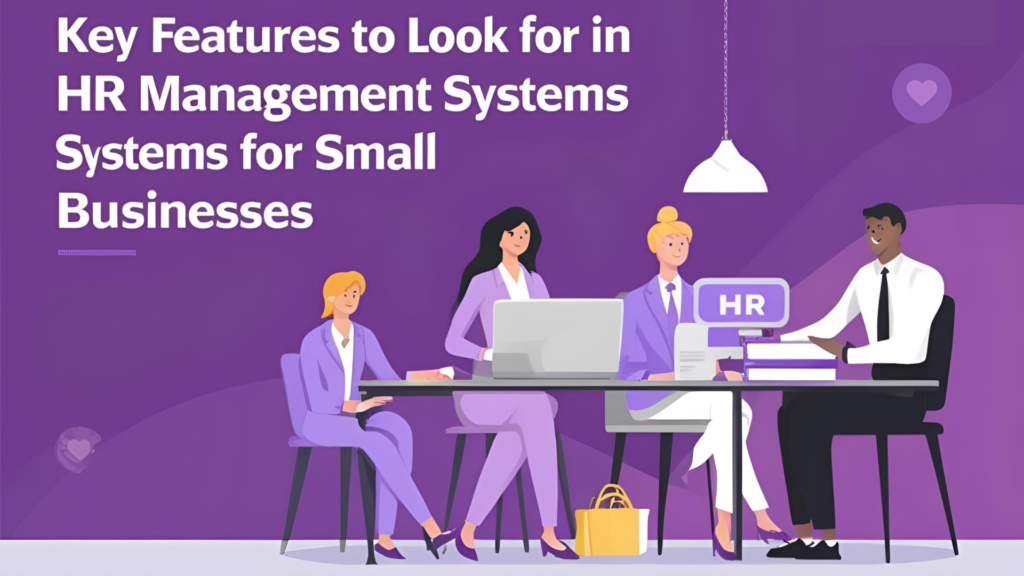Being a small business owner requires dealing with a different range of challenges, not least of all when it comes to people management. With fewer hours, reduced budgets, and fewer personnel on the ground, many small business owners find themselves juggling many hats, taking on HR functions alongside the remainder of core business functions.
That’s where HR management systems for small businesses become essential. These systems are no longer the sole domain of giant corporations—nowadays, they’re affordable, accessible, and amazingly useful for even the smallest teams.

Why Do Small Businesses Need an HR Management System?
While massive companies employ gigantic departments full-time for HR, small businesses are more dependent on minimal resources. That means that a strong HRMS becomes not only convenient but a necessity. Here’s why an investment in it is worth it:
1. Time-Saving and Efficiency
Manual HR tasks like keeping attendance records, processing documents, and payroll processing are not only time-consuming but also prone to human error. HR management systems automate these tasks so that managers and small business owners can focus on strategic tasks.
2. Cost-Effective HR Services
Hiring full-time HR staff is costly for a small business. With an HRMS, you can obtain access to critical HR services for a small business without having a big in-house HR department. It serves as a virtual HR assistant—24/7, scaling with your expanding business.
3. Improved Compliance
Staying tax and labor law complaints is non-negotiable. All major HR management systems possess compliance elements that are included as part of the system, including document renewal reminders automatically, monitoring employee certifications, and making sure your business is compliant with employment law.
4. Centralised Employee Data
All personnel records—ranging from contracts and holiday allowances to performance reviews—can be stored safely in one database. Centralization is not only convenient to access but also facilitates better decision-making.
5. Professionalism
Using an HRMS is a positive reflection on your company. It shows employees that their data is being kept safe and professionally, something that can increase trust and job satisfaction.

Key Features to Look For In HR Management Systems for Small Businesses
Choosing the perfect HRMS is not just about choosing the most popular one. You need one that’s specifically designed for small business human resources—simple, scalable, and budget-friendly. Here are some of the key features:
1. Employee Self-Service
Empower your employees to be self-sufficient with self-service functionality that allows them to handle personal information, apply for leave, view payslips to download, and view their rosters. This reduces HR workload and increases transparency.
2. Compliance Tracking
Make sure the system has features for tracking required compliance obligations, such as labor law updates, tax returns, and employee certifications. Automatic reminders can save you costly legal issues down the road.
3. Payroll and Time Tracking
Integrated payroll capabilities are a major advantage. Look for a system that is capable of calculating wages, deductions, and tax filings, as well as direct deposit. Time tracking features help track attendance, curb time theft, and simplify overtime calculations.
4. Recruitment and Onboarding
Even tiny organizations hire from time to time. A good HRMS should make candidate tracking, job postings, interview scheduling, and onboarding checklists easy. It eases the hiring process and improves the candidate experience.
5. Performance Management
Performance appraisals, goal progress, and employee feedback should be part of the system. They help you identify talent gaps, recognize stars, and facilitate employee growth.
6. Scalability
As your business grows, so will your HRMS. Ensure the software can manage more users and has more functionality as your small business HR needs increase.
7. Data Protection
HR systems deal with sensitive information. Choose a solution that complies with data protection best practices, including encryption, multi-factor authentication, and regular backups.
Final Thoughts
Investing in a reliable HR management system for small businesses is no longer a luxury—it’s a necessity. Whether you’re managing a five-person team or fifty, the right HRMS can save time, reduce costs, and ensure your HR operations remain efficient and compliant.
By choosing a system with important features like employee self-service, compliance tracking, and payroll integration, you can create a solid HR foundation that grows with your business.
Don’t let your processes get out of hand—start exploring your options early and find a solution that meets your current and future small business human resource needs.
If you are looking for real-world guidance on how to initiate or improve HR systems, my site is full of helpful information and tips for small business owners.
